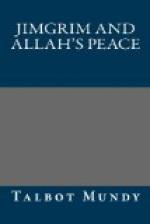Anazeh looked at the bottles of brandy—looked at me—and prayed under his breath; or, at any rate, it looked and sounded like a prayer. He may have been swearing. He and I were not very far from the door; the seats near the head of the table had all been taken. I sat down at once, so as not to be conspicuous, but Anazeh remained standing so long that at last Abdul Ali called to him to sit down and eat his fill, using the offensively magnanimous tone of voice that some men can achieve without an effort. I think Anazeh had been waiting for just that opening.
“I have twenty men outside,” he announced. “Shall I eat, and not they?”
“This is a feast for notables,” said Abdul Ali.
“A little bread with my own men is better than meat and drink at a traitor’s table,” Anazeh answered. “Wallahi! (By God!) I go to eat with honest men!” He laid a hand on my head. “Ye have said this effendi must stay in the castle. Well and good. Whoever harms him or offers him indignity shall answer to me and my men for it!” He bowed to me like a king taking leave of his court. “Lailtak sa’idi. Allah yifazak, effendi!” (Good night. God keep you, effendi!) With that he stalked out, and the door slammed shut behind him. Everybody, including Abdul Ali, laughed.
The banquet was a boresome business—an interminable competition to see who could eat and drink the most. With my interpreter gone, and everybody else too busy guzzling to trouble to speak distinctly for my benefit, I had to depend on my ayes for information and naturally used them to the utmost. I noticed that Abdul All of Damascus, Jimgrim Suliman ben Saoud and myself were the only men in the room, servants included, who ate and drank within the bounds of decency and reason. One of the servants, walking up and down the table-cloth with brandy and relays of vegetables, was drunk very early in the game and had to be thrown out.
Abdul Ali kept conversation going on the subject of the raid. The more the brandy bottles circulated the easier he found it to keep enthusiasm burning. He talked about me, too, several times, and every time that subject cropped up all eyes turned in my direction. I think he was making the most of the school idea, mixing up the raid with education and serving the mixture hot, as it were, with brandy sauce.
But over the way, about half-way down the table, the Ichwan Suliman ben Saoud, dead-cold-sober and abstemious, as befitted a fanatic, was talking, too. He was quite evidently talking against Abdul Ali, so that the Damascene kept looking at him with a troubled expression. He glanced frequently at the door, too, as if he expected some one who could put an end to Suliman ben Saoud’s intrigue.
But it was a long time before the door opened and the second of his old-rose parasites came in. I had not noticed until then that the man was missing. He thrust a packet of some sort into Abdul Ali’s hands. He whispered. The Damascene’s face darkened instantly, and he swore like a pirate. Then, I suppose because he had to vent his wrath on somebody, he shouted to me in German all down the length of the table:




